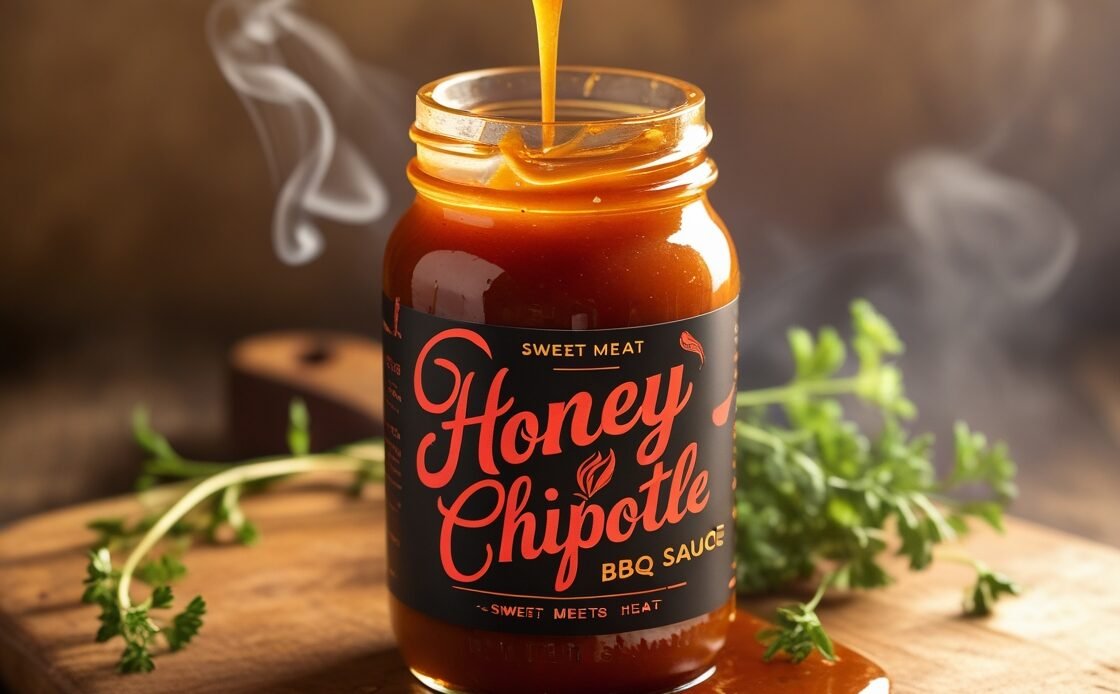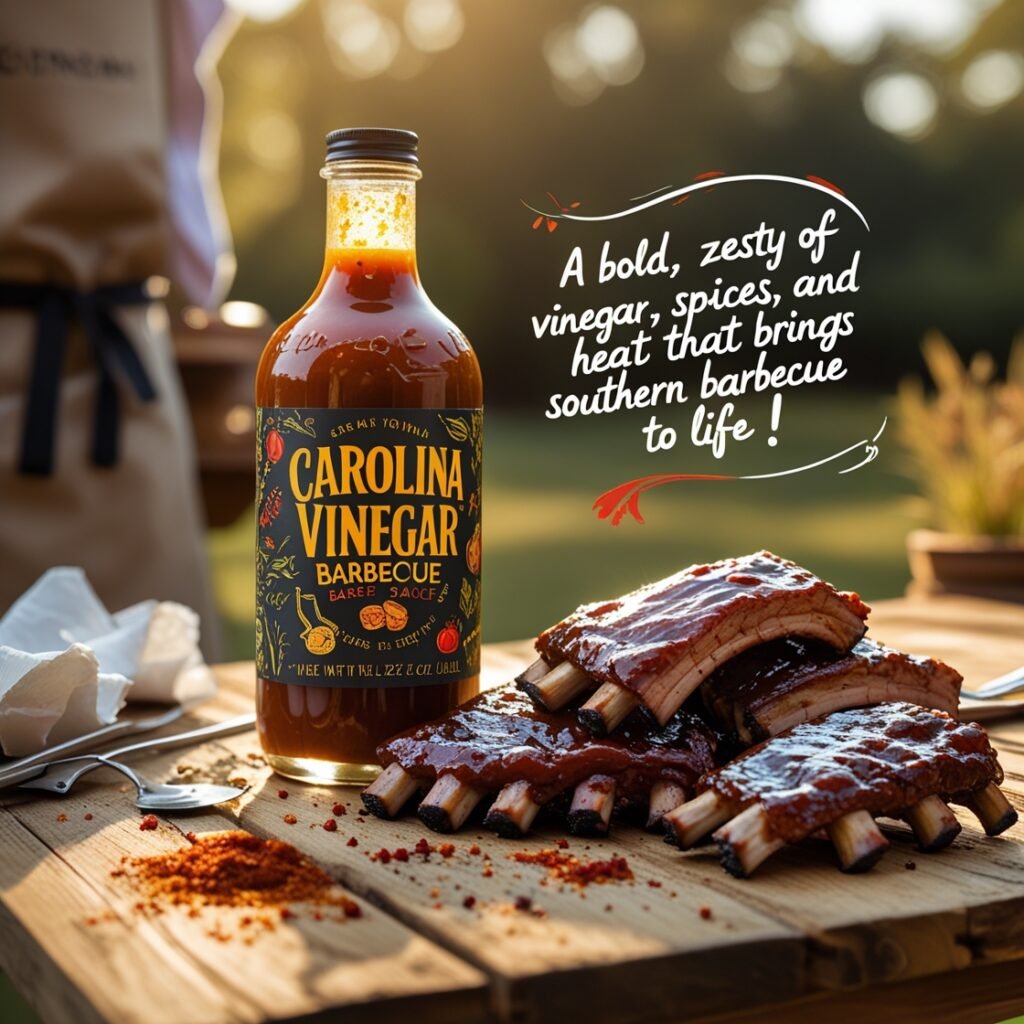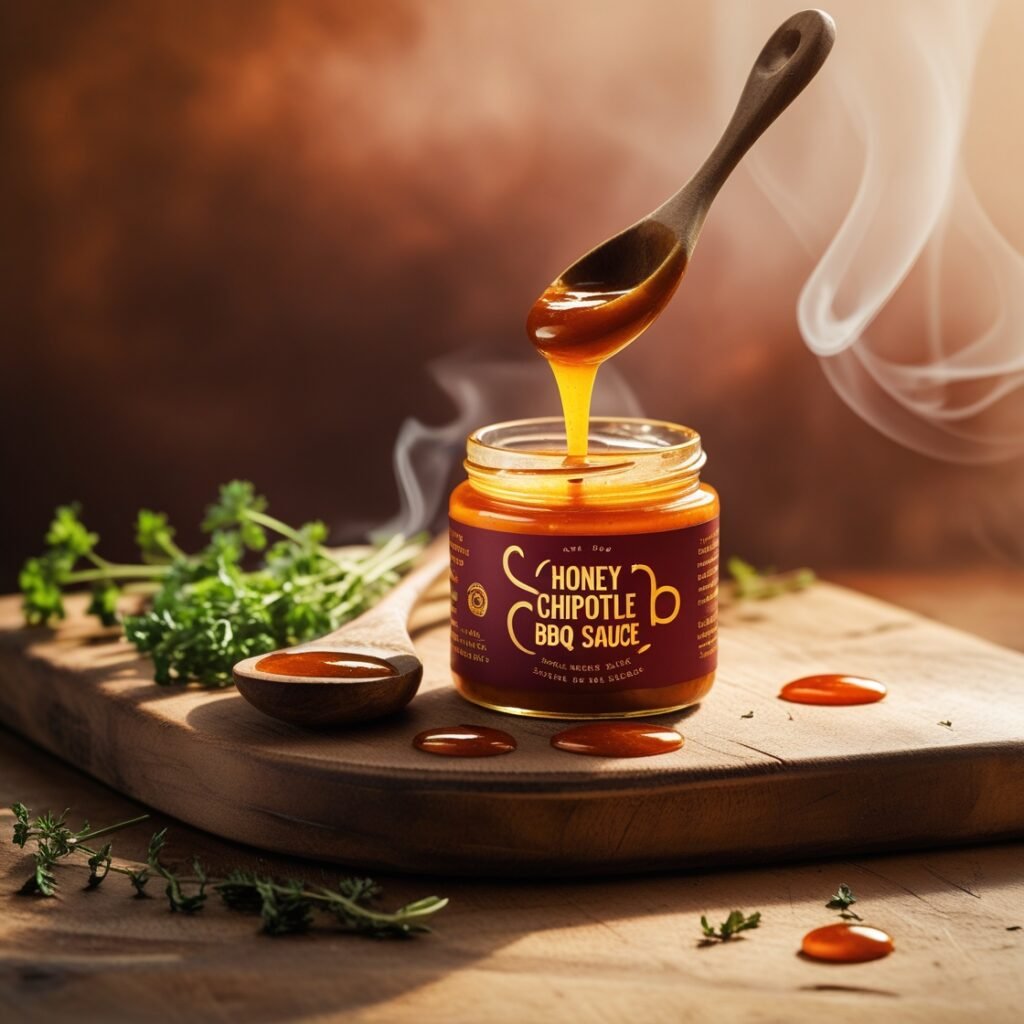
Imagine you’re at a backyard grill, surrounded by the smell of smoke. The first brush of sauce brings a sharp, vinegar taste. This flavor cuts through the smoke without overpowering it. That’s the magic of Carolina vinegar barbecue sauce.
For generations, this tangy sauce has been a key part of Southern cooking. It’s tied to the humble mop sauce used to baste meats slow-cooked over low heat.
Unlike thick, sweet sauces found in stores, Carolina vinegar barbecue sauce is simple yet powerful. Its thin, translucent form soaks into the meat, adding flavor without covering it up. This sauce isn’t just a condiment; it’s a gateway to the authentic tastes of Carolina’s barbecue pits.
Whether you’re a seasoned pitmaster or a weekend griller, this sauce teaches you to appreciate simplicity. It shows that sometimes, the best things in life are the simplest.
Key Takeaways
- Carolina vinegar barbecue sauce uses mop sauce roots to balance tang and smoke.
- Its thin, vinegar-based formula penetrates meat for deeper flavor compared to thicker sauces.
- Regional pride defines its variations, from Eastern Carolina’s sharp style to Western’s subtle tomato additions.
- Learning to apply it properly unlocks the tradition of Carolina-style barbecuing.
- This sauce’s low-sugar profile offers a bold, healthier alternative to sweeter options.

What Is a Mop Sauce and Why It Matters
Mastering barbecue means knowing about mop sauce, a key part of Southern cooking. It’s not just a sauce; it’s a technique. This thin, flavorful liquid is brushed or mopped on meat during smoking. It keeps the meat tender and juicy for hours of slow cooking.
The Definition and Purpose of Mop Sauce
Mop sauce is a thin, acidic mix like vinegar with spices. Its main job is to add flavor and prevent drying. It’s like a lifeline for ribs or pork shoulder during long smokes. Unlike thick, sweet finishing sauces, it’s applied every hour. This keeps your meat moist and tender.
How Mop Sauce Differs from Regular BBQ Sauce
- Texture: Mop sauce is watery; regular BBQ sauce is thick and sticky.
- Ingredients: Vinegar-based BBQ sauce lacks added sugars, avoiding charred sweetness.
- Timing: Mop sauce is applied during cooking; regular sauce is added at the end.
The Science Behind Moisture Retention
Acids in vinegar based BBQ sauce break down collagen in tough cuts, unlocking moisture. The liquid penetrates fibers, creating a steam effect inside the meat. This science isn’t guesswork—pitmasters rely on it to balance smoky heat with tangy brightness. Properly used, it turns dry cuts into fall-apart masterpieces.
The Rich History of Carolina Vinegar Barbecue Traditions
Carolina vinegar barbecue sauce has its roots in European preservation methods. Settlers brought vinegar to America in the 1700s. It was perfect for keeping pork fresh longer because of its antimicrobial properties.
Over time, using vinegar to baste meats became a tradition. Early cooks found that mop sauce made meats taste better and stay moist during long smokes.
By the 1800s, pit masters in Carolina perfected their techniques. They used vinegar, red pepper, and salt, which were easy to find in rural areas. Whole-hog barbecues became big social events, with mop sauce applied with mops or brushes.
This turned a practical solution into a form of art. It showed how resourceful and community-focused Carolina barbecue was.
As time went on, different regions developed their own flavors. Eastern North Carolina stuck to vinegar-only, while Western areas added tomato. South Carolina’s mustard-based sauce came from German immigrants. These differences show how geography shaped Carolina’s barbecue.
| Region | Key Ingredient Focus | Defining Trait |
|---|---|---|
| Eastern NC | Pure vinegar and pepper | Unadulterated tang |
| Western NC | Tomato-thinned vinegar | Sweet-tangy balance |
| South Carolina | Mustard and vinegar mix | Distinctive yellow hue |
Today, pit masters like Ed Mitchell and Benjamin keep these traditions alive. Their recipes honor the history of Carolina vinegar barbecue sauce. They show that simplicity and history are still key to this iconic cuisine.
Essential Ingredients for Authentic Carolina Vinegar Mop Sauce
Learning to make vinegar based bbq sauce starts with knowing its key parts. Carolina vinegar barbecue sauce is simple, so each ingredient is important for its tangy taste and heat.
The Vinegar Foundation: Choosing the Right Type
The heart of Carolina vinegar barbecue sauce is the vinegar. Apple cider vinegar adds a touch of sweetness. White distilled vinegar brings sharpness. Wine vinegar adds a hint of fruit.
Choose vinegar with 5% acidity to keep flavors balanced. Try different batches to find the perfect mix.
Spices and Seasonings That Define the Flavor
Traditional recipes include:
- Red pepper flakes for a slow heat
- Coarse black pepper for depth
- Kosher salt for umami without saltiness
- Cayenne pepper in Eastern styles for a fiery kick
Western Carolina versions might add paprika for smokiness. Adjust the mix to fit your taste—Eastern likes less salt, Western more pepper.
Optional Add-ins for Customization
Try adding:
- 1 tsp brown sugar to soften the vinegar
- Honey or apple juice for sweetness
- Bourbon for depth in finishing sauces
- Mustard powder to echo South Carolina’s mustard-style
Keep everything balanced—no one ingredient should take over. Always taste as you go!
Basic Carolina Vinegar Barbecue Sauce Recipe
Learn to make the classic vinegar based bbq sauce with this easy moppin sauce recipe. It uses simple ingredients but packs a big punch of flavor.
- Ingredients (makes 2 cups):
- 1 ½ cups apple cider vinegar
- ¼ cup water
- 1 tbsp salt
- 1 tbsp black pepper
- 2 tsp red pepper flakes (adjust for heat level)
- 2 tbsp yellow mustard
- 1 tbsp granulated sugar (optional)
Mix all ingredients in a saucepan over medium heat. Stir until the sugar melts. Simmer, uncovered, for 10 minutes to blend the flavors. Let it cool before using as a mop sauce or finishing sauce.
Pro tips: Taste it after cooking and tweak the seasoning. Add more vinegar for a tangy taste or sugar to balance the acidity. For a richer moppin sauce recipe, chill it overnight. Store leftovers in airtight containers for up to 3 weeks.
“The magic happens when flavors mature. Let it sit like fine wine—just add meat instead of grapes.” — Traditional North Carolina pitmasters

Want to make more? Just double the ingredients. Use a spray bottle for mopping ribs or pour it over pulled pork. This vinegar based bbq sauce can be adjusted to your taste. Start with a mild flavor and add more heat as you like.
Regional Variations: Eastern vs. Western North Carolina Styles
Barbecue traditions in the Carolinas vary like their landscapes. Let’s look at how geography shapes carolina vinegar barbecue sauce and mop sauce in three regions.
Eastern Carolina’s Pure Vinegar Approach
In Eastern North Carolina, tradition is key. Pit masters like Bob’s BBQ in Wilson stick to a simple mop sauce. It’s made of vinegar, red pepper flakes, and nothing more. This style pairs well with slow-cooked whole hog, highlighting pork’s natural taste.
“We don’t mess with perfection,” says third-generation pit master Mary Lee of Lee’s Barbecue. The vinegar’s sharpness cuts through fatty meats, showing a 200-year-old tradition.
Western Carolina’s Tomato-Tinged Version
West of the Piedmont, Lexington-style carolina vinegar barbecue sauce gets a twist. Tomato paste or ketchup adds thickness, making the sauce glossy and slightly sweet. Restaurants like Wilson’s Bar-B-Que use this mix to enhance pork shoulder, showing vinegar and richness can work together.
Locals say the change came when railroads brought tomatoes, blending old traditions with new ideas.
South Carolina’s Mustard Influence
South Carolina goes its own way with mustard-based mop sauce. German immigrants in Columbia and Charleston replaced vinegar with stone-ground mustard, creating a zesty contrast. Harry’s Big Boy in Columbia serves this style with mutton or chicken, showing cultural fusion.
While some might debate it, it’s a sign of regional adaptability.
The Perfect Mop Sauce for Ribs: Adjusting for Different Cuts
Mastering the mop sauce for ribs begins with knowing your cut. Each type of rib—spare, baby backs, or St. Louis—needs adjustments. This ensures the vinegar base gets in without being too strong. Here’s how to make your mop sauce just right:
- Spare Ribs: These ribs are fatty and meaty. Use a thinner sauce. Add 1–2 tablespoons of apple cider vinegar to your base for better penetration.
- Baby Back Ribs: These ribs are leaner. They don’t have as much fat to hold moisture. Mix in a bit of rendered pork fat with your sauce to keep juices in.
- St. Louis Cut: These ribs have trimmed edges. They do well with a spiced sauce. Add black pepper or cayenne for a spicy kick without hiding the vinegar’s tang.
| Rib Type | Key Adjustment | Sauce Ratio |
|---|---|---|
| Spare Ribs | Thin consistency | 1:1 vinegar to liquid |
| Baby Back Ribs | Fat enrichment | 1 part fat per 3 parts sauce |
| St. Louis Cut | Spice enhancement | 1 tsp spice per ½ cup sauce |
“The best Carolina pitmasters know: ribs aren’t one-size-fits-all. Your mop sauce must dance with the meat’s natural oils.” –Sam Jones, Lexington BBQ Legacy
For spare ribs, mop every 45 minutes. Baby backs need mopping every 30 minutes because they’re leaner. Always remove the membrane before applying sauce. This lets the mop sauce reach the meat. Adjusting your recipe this way keeps ribs tender and highlights the vinegar’s bright flavors.
Application Techniques: How to Properly “Mop” Your Meat
Learning the right way to apply mop sauce is key. It makes your barbecue taste better, not worse. The right tools, timing, and method can make a big difference.
Tools of the Trade: Mops, Brushes, and Sprayers
| Tool | Pros | Cons |
|---|---|---|
| Cotton Mop | Traditional soak-and-dab method; absorbs and distributes sauce evenly | Requires hand-washing after each use |
| Silicone Basting Brush | Non-porous, dishwasher-safe, and easy to clean | Less sauce retention than cotton mops |
| Spray Bottle | Quick even coverage without direct contact | Risk of overspray diluting dry rubs |
Timing Your Mopping for Maximum Flavor
- Start with mop sauce after the first 30 minutes of cooking to keep meat moist.
- Reapply every 20-30 minutes for ribs. For bigger cuts like pork shoulder, wait 45 minutes.
- Stop mopping 30 minutes before you finish cooking to let juices come back.
Avoiding Common Application Mistakes
- Over-saturating: Apply a thin layer—too much can make the bark soggy and flavor weak.
- Cold sauce shock: Warm your moppin sauce recipe to room temperature before using.
- Cross-contamination: Use different tools for raw and cooked meat to avoid bacteria.
Storing Your Homemade Moppin Sauce Recipe
Keeping your vinegar based bbq sauce fresh and safe is key. First, move your moppin sauce into a clean glass jar or airtight container. Glass, like Ball jars, is better than plastic because it doesn’t let vinegar’s acidity in. Squeeze bottles make it easy to apply sauce without getting it all over.
- Refrigerate immediately: Put it in the fridge within two hours to slow down bacteria.
- Use within 3 weeks: Vinegar’s acidity helps it last longer, but flavors might fade over time.
- Freeze extras: Pour extra sauce into ice cube trays. Thaw only what you need later.
Before using, check for mold or a sour smell, not just vinegar’s tang. If it separates, just shake it. Label containers with dates and spice types to keep track. Don’t store it in metal, as vinegar can react with it.
“A labeled jar and clean utensils make all the difference between a pantry staple and a science experiment,” says pitmaster Sarah Lee of Smoky Mountain BBQ Co.
Freezing in small portions keeps flavors strong. Always let thawed sauce come to room temperature before using. This prevents shocking meats with cold sauce during cooking.
Pairing Carolina Vinegar Barbecue Sauce with the Right Meats
Carolina vinegar barbecue sauce is perfect for meats that need a tangy kick. It’s great with both classic and creative dishes. This way, you get bold, balanced flavors.
Traditional Pork Preparations
The sauce’s acidity cuts through pork’s fat. For ribs, it keeps the meat moist during slow cooking. Eastern Carolina styles use it straight on whole hogs or shoulders.
Western Carolina versions might add a bit of sugar. But the vinegar is still the main attraction.
Chicken and Turkey Applications
Lean poultry loves the sauce’s zest without being heavy. Brush chicken thighs or turkey drumsticks with it during grilling. This crisps the skin and adds tang to the meat.
For whole birds, baste with the sauce every 30 minutes. This keeps the meat moist. A trick: thin the sauce by cooking it briefly for a glaze.
Unexpected Uses Beyond Barbecue
- Use as a marinade for grilled veggies like corn or zucchini.
- Drizzle over coleslaw or potato salad for a tangy twist.
- Mix with olive oil as a salad dressing or dipping sauce.
Try adding the sauce to baked beans or collard greens for a savory kick. Its vinegar base is also great as a brine for shrimp or tofu. This shows its versatility beyond traditional meats.
Troubleshooting Your Vinegar Based BBQ Sauce
Even the best moppin sauce recipe can face problems. Here are fixes for common issues:
- Too tart? If your vinegar based BBQ sauce is too sharp, add 1-2 tablespoons of honey or apple juice for each cup. For a tangy touch, mix in a bit of mustard.
- Thin or separated? Warm the sauce a bit to mix the oils again. To thicken, blend 1 tsp of cornstarch with cold water and add it to the sauce.
- Flavor flat? Boost it with smoked paprika or a pinch of cayenne. For Eastern Carolina style, add more red pepper flakes. For Western, use a spoon of tomato paste.
- Bitter aftertaste? Harshness often comes from burnt spices. Strain and replace with fresh spices. A pinch of brown sugar can also help soften bitter tastes.
- Spice imbalance? Too spicy? Mix in more vinegar. Not spicy enough? Add crushed red pepper flakes, ¼ tsp at a time.
Always taste as you adjust. For separated oils, strain and mix again with a hand mixer. If it’s too sweet, a squeeze of fresh lemon juice can help. Remember, small changes are best. Test them in small batches first to save your sauce.
Health Benefits of Choosing Vinegar Based Sauces Over Sweet Alternatives
Choosing vinegar based bbq sauce, like carolina vinegar barbecue sauce, is more than a flavor choice. These tangy sauces have nutritional benefits that sweet sauces don’t. They are a healthier option.
Lower Sugar Content and Glycemic Impact
Sweet BBQ sauces have 10-15g of sugar per serving. But, carolina vinegar barbecue sauce has only 1-3g. This makes vinegar-based sauces better for blood sugar control.
A 2022 study in Nutrition Today showed vinegar’s acetic acid slows down starch digestion. It reduces blood sugar spikes by 20-30% after meals.
Potential Digestive Benefits of Vinegar
Acetic acid in vinegar helps with digestion. It can increase good gut bacteria and improve nutrient absorption. Dr. Emily Carter, a registered dietitian, says:
“The acetic acid in vinegar-based sauces supports digestion without artificial additives, promoting a healthier gut environment.”
Calorie Comparison with Traditional BBQ Sauces
| Sauce Type | Calories/Serving | Sugar (g) | Sodium (mg) |
|---|---|---|---|
| Carolina Vinegar Sauce | 15 | 2g | 180mg |
| Traditional Tomato BBQ Sauce | 50 | 12g | 400mg |
Vinegar-based sauces have fewer calories and less sodium. They also have less sugar. For instance, a ¼ cup of vinegar based bbq sauce saves 35 calories and 10g of sugar compared to commercial brands.
Conclusion: Embracing the Tangy Tradition of Carolina Mop Sauce
Carolina vinegar barbecue sauce is more than a sauce. It connects us to centuries of cooking history. It’s great for pork, ribs, or chicken, offering a tangy twist to sweeter sauces. Its ability to keep food moist and flavorful makes it a favorite among pitmasters and home cooks.
Discovering Eastern and Western Carolina styles or mastering the moppin sauce recipe brings authentic flavors to your table. Vinegar-based sauces are low in sugar and good for your health. Every time you use this sauce, you connect with a tradition that values simplicity and smoke.
Begin with the basic recipe and tweak the spices to your liking. Practice when to use it during cooking. Brands like Skylar’s and Pitmaster’s Choice show how this tradition lives on today. Sharing these sauces at events or competitions keeps Carolina’s barbecue alive, showing vinegar-based sauces still have a place in today’s world.
Whether you’re working on ribs or exploring South Carolina’s mustard-based sauces, Carolina vinegar barbecue sauce is a key to true American barbecue. Its flexibility and rich history make it a story worth tasting and sharing.
FAQ
What is Carolina vinegar barbecue sauce?
Carolina vinegar barbecue sauce is a tangy, vinegar-based sauce. It’s thinner than most BBQ sauces. It’s made to highlight the meat’s natural flavors, not hide them. This makes it a key part of true Carolina barbecue.
How do I use mop sauce for ribs?
Use mop sauce on ribs during cooking to keep them moist. Adjust how often you mop based on the rib type. Think about fat content and membrane presence for even flavor.
What makes mop sauces different from regular BBQ sauces?
Mop sauces are thinner and less sweet than regular BBQ sauces. They’re used throughout cooking to add flavor and moisture. Regular sauces are mainly for finishing touches.
Can I make my own mop sauce recipe at home?
Yes! Making mop sauce at home is easy with basic ingredients like vinegar, spices, and seasonings. A classic Carolina vinegar mop sauce often includes apple cider vinegar, red pepper flakes, and salt.
What types of vinegar are best for Carolina vinegar barbecue sauce?
Apple cider vinegar, white vinegar, and wine vinegar are top choices for Carolina barbecue sauce. Each vinegar gives a different flavor. Choose based on your taste preferences.
How should I store my homemade vinegar-based BBQ sauce?
Keep your homemade vinegar-based BBQ sauce in a clean, airtight container in the fridge. Its high vinegar content helps preserve it. For the best taste, use it within a few weeks. Always label it with the date.
Are there health benefits to using vinegar-based sauces?
Yes, vinegar-based sauces have less sugar and a lower glycemic impact than sweet BBQ sauces. Vinegar may also aid digestion due to its acetic acid.
Can I use Carolina vinegar barbecue sauce on meats other than pork?
Absolutely! While it’s often on pork, Carolina vinegar barbecue sauce is great on chicken, turkey, and veggies too. It’s a versatile choice for many dishes.
What are the key spices in a Carolina vinegar mop sauce?
Key spices in a Carolina vinegar mop sauce include red pepper flakes, black pepper, and salt. You can add other seasonings based on your taste or regional styles.
How can I fix a vinegar-based sauce that is too acidic?
To fix a too acidic vinegar-based sauce, add a sweetener like brown sugar or honey. Start with a little to keep the sauce’s character while adjusting the flavor.




